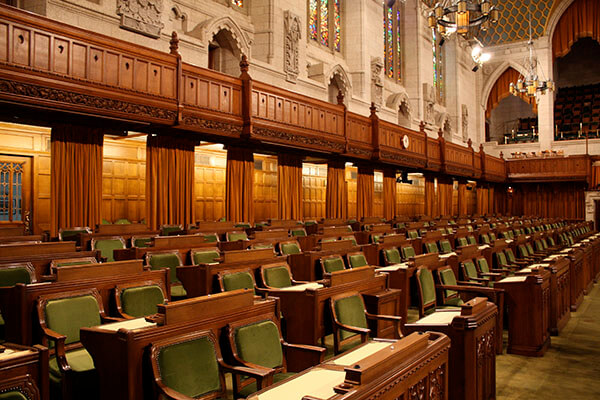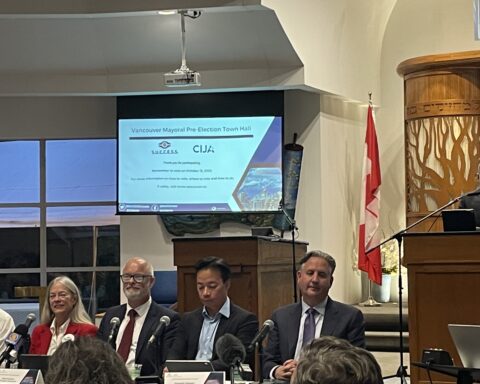
As the 2015 Canadian Federal Elections approaches, the question remains which party will win the majority of votes and fill these seats in the House of Commons? Experts say newcomers will play a vital role in the outcome.
Photo Credit: Wikipedia Creative Commons
Twenty years ago the Reform Party of Canada was at the apex of its political success. The party had single-handedly pulled the political right from the wreckage of Brian Mulroney’s final years, reinvigorated and revitalized Canadian conservatism, stood in control of 52 seats in the House of Commons (just two shy of the opposition Bloc Québécois), and – given its populist roots and image – appeared to many Canadians as a genuinely popular voice in federal politics.
Many were swayed, but not all. That was partly because the Reform Party had also vociferously opposed Canada’s official policy of multiculturalism, advocated for dramatic reductions in immigration quotas, and targeted “problem” immigrant communities. Just a few years earlier, its Blue Book had included provisions against using immigration policy “to radically or suddenly alter the ethnic makeup of Canada, as it increasingly seems to be.” And more than a few Reform MPs had publicly expressed anti-immigrant views. In the mid-1990s, at the height of its success, Reform was influential enough to push the ruling Liberals – for decades, the “natural” party for new Canadians – to reduce immigration levels.
Reform learned what is, and what will continue to be, a political truth in this country: the votes of new Canadians matter.
Within five years, the Reform Party had collapsed, as did its short-lived successor, the Canadian Alliance. The reasons for Reform’s demise are, of course, as varied as they are complex, but its inability to gain the support of significant numbers of new Canadians, especially in vote-rich Ontario, was undoubtedly an important factor. Reform learned what is, and what will continue to be, a political truth in this country: the votes of new Canadians matter. No party with federal aspirations can afford to disregard or alienate new Canadians, who are informed, engaged, and inclined to exercise their political rights.
Winning the “Ethnic Vote”
This is a lesson that Stephen Harper’s Conservatives have taken to heart. The Conservatives have endeavored to appeal to socially conservative “ethnic voters” by politicizing same-sex marriage. The party has also developed an ambitious “ethnic outreach strategy”, apologized to Chinese, Sikh and First Nations communities for historical harms, increased annual immigration admissions, and championed official multiculturalism – a remarkable feat for a party whose predecessors had bemoaned “hyphenated Canadians.” The Conservative Party’s efforts to woo new Canadian voters challenged the Liberals’ long-standing electoral dominance in immigrant communities. The strategy appears to have paid off: the majority government Stephen Harper won in 2011 took 73 of Ontario’s 106 seats, including 32 of the GTA’s 47, where immigrants make up 50 per cent or more of the total population.
Political loyalties typically do not change overnight, and for decades Canadians from non-European origins mostly supported the federal Liberal Party, even at times when that party fell out of favour with other Canadians.
How successful the Conservatives were in courting the support of new Canadians, and whether that success will be short-lived or enduring, is an open question. A single election is one thing, but long-standing ties to political parties are something else entirely. Political loyalties typically do not change overnight, and for decades Canadians from non-European origins mostly supported the federal Liberal Party, even at times when that party fell out of favour with other Canadians. There is also the emergence of the New Democratic Party (NDP) to consider. In other places, political parties with historic ties to the working class and organized labour – for example, the U.K. Labour Party, the Australian Labor Party, and the U.S. Democratic Party – have also been the preferred parties of immigrant communities. The NDP has never received similar levels of support from new Canadians. But the Orange Wave of 2011 brought the NDP to new heights, and NDP support is strongest in the urban areas where most new Canadians live. Could the NDP win more votes in immigrant communities?
Enter Election Watch
This column will explore the importance of the new Canadian vote. In the months leading up to the federal election, we will consider a range of questions, including:
· What exactly is the “ethnic vote”? How is it understood and/or defined by different parties, media and researchers? Is there such a thing as an ethnic vote, or are there many different (perhaps conflicting) ethnic votes? Do assumptions about the “ethnic vote” portray widely diverse communities as sharing in a single set of values or interests?
· What are the key ridings to watch in the lead-up to the 2015 election? How will demographic factors affect local, regional and national voting patterns?
· What are the issues of greatest concern to new Canadians and/or longstanding ethnic communities? How are the different parties addressing them?
· Are religious practices being politicized for electoral purposes, as has been the case in many European states? How are new Canadians likely to respond to such efforts?
We will explore how immigration and new Canadian communities are helping to shape the country’s political landscape. Broadly speaking, Canada is an immigrant-receiving success story. In the last few decades, the country has opened itself to a high volume of immigration, provided immigrant populations with relatively easy access to naturalization and citizenship, and maintained its social cohesion, political stability and economic wellbeing along the way. While new Canadians undoubtedly face barriers in accessing social, political and economic opportunities, they fare better in these respects than do immigrant communities in many other countries. New Canadians are, then, poised to profoundly influence the 2015 federal election, and more broadly, Canada’s political life. We look forward to analyzing their influence in the months ahead.
Inder S. Marwah is a SSHRC Postdoctoral Fellow at McMaster University’s department of political science.
Stephen E. White is a SSHRC Postdoctoral Fellow at Concordia University’s department of political science.
Phil Triadafilopoulos is associate professor of political science at the University of Toronto Scarborough and the School of Public Policy and Governance.




